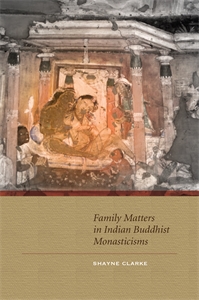Family Matters in Indian Buddhist Monasticisms
- About the Book
-
Scholarly and popular consensus has painted a picture of Indian Buddhist monasticism in which monks and nuns severed all ties with their families when they left home for the religious life. In this view, monks and nuns remained celibate, and those who faltered in their “vows” of monastic celibacy were immediately and irrevocably expelled from the Buddhist Order. This romanticized image is based largely on the ascetic rhetoric of texts such as the Rhinoceros Horn Sutra. Through a study of Indian Buddhist law codes (vinaya), Shayne Clarke dehorns the rhinoceros, revealing that in their own legal narratives, far from renouncing familial ties, Indian Buddhist writers take for granted the fact that monks and nuns would remain in contact with their families.
The vision of the monastic life that emerges from Clarke's close reading of monastic law codes challenges some of our most basic scholarly notions of what it meant to be a Buddhist monk or nun in India around the turn of the Common Era. Not only do we see thick narratives depicting monks and nuns continuing to interact and associate with their families, but some are described as leaving home for the religious life with their children, and some as married monastic couples. Clarke argues that renunciation with or as a family is tightly woven into the very fabric of Indian Buddhist renunciation and monasticisms.
Surveying the still largely uncharted terrain of Indian Buddhist monastic law codes preserved in Sanskrit, Tibetan, and Chinese, Clarke provides a comprehensive, pan-Indian picture of Buddhist monastic attitudes toward family. Whereas scholars have often assumed that monastic Buddhism must be anti-familial, he demonstrates that these assumptions were clearly not shared by the authors/redactors of Indian Buddhist monastic law codes. In challenging us to reconsider some of our most cherished assumptions concerning Indian Buddhist monasticisms, he provides a basis to rethink later forms of Buddhist monasticism such as those found in Central Asia, Kaśmīr, Nepal, and Tibet not in terms of corruption and decline but of continuity and development of a monastic or renunciant ideal that we have yet to understand fully.
- About the Author(s)
-
Shayne Clarke, Author
Shayne Clarke is associate professor in the Department of Religious Studies at McMaster University.
- Reviews and Endorsements
-
- Shayne Clarke’s Family Matters is truly a welcome addition to scholarship in the field of Buddhist Studies. . . . Clarke has uncovered a narrative trajectory in the vinaya (and other Buddhist literatures) which has the potential to radically alter scholarly conceptions about the post-ordination relationship of the Indian Buddhist to his or her family.
—International Journal of Asian Studies - In his outstanding book Family Matters in Indian Buddhist Monasticisms, Shayne Clarke examines ancient Indian Buddhist inscriptions and monastic rulebooks to show that these facets may indeed have factored into early monastic life, thereby greatly enriching our understanding of Buddhists renunciation from its earliest phase.
—Rory Lindsay, Harvard University - Clarke’s eloquently and cogently written book should be of interest to everyone concerned with religious communities because he raises methodological issues that are pertinent to those interested in both Buddhist and non-Buddhist traditions. By employing an impressive array of sources in various languages, he gives us a carefully nuanced and fascinating study of the relationship between early Indian Buddhist monastic and familial life. Numerous translations of evidence from a variety of genres and astute analyses keep the reader riveted to his account. After reading this, my view of Buddhist monasticism will never be the same. This is clearly destined to be a classic in the field.
—Paul Groner, University of Virginia - In this volume, Shayne Clarke effectively questions some fundamental assumptions about the nature of Indian Buddhist monasticism and opens our eyes to the fact that monks and nuns, when they became monks and nuns, did not necessarily sever all family ties. Rather, they continued, long after their ordinations, to maintain various types of connections—social, emotional, economic, residential, and sexual—with their kith and kin. By brilliantly mining often overlooked sources in Chinese, Tibetan, Sanskrit and Pali, the author exemplifies and analyzes these ongoing relations, which have generally been thought of as anomalies and aberrations, and shows that they may more accurately be viewed as monastic affirmations of accepted behaviors. This book is a major accomplishment that will do much to change our understanding of the practice of Indian Buddhism.
—John Strong, Bates College - Clarke's work illuminates some neglected corners of early monastic practice, challenging the assumption that the ‘homeless life’ necessarily involved severing all family ties. What he brings to light is both surprising and relevant, not only for Buddhist scholars, but also for modern day Buddhist practitioners seeking to be true to their traditions. Written with clarity, simplicity, attention to detail, and a subtle sense of humor, Clarke's book is the rarest of treats: a thought-provoking academic work that is also a pleasure to read.
—Tim Ward, author, What the Buddha Never Taught
- Shayne Clarke’s Family Matters is truly a welcome addition to scholarship in the field of Buddhist Studies. . . . Clarke has uncovered a narrative trajectory in the vinaya (and other Buddhist literatures) which has the potential to radically alter scholarly conceptions about the post-ordination relationship of the Indian Buddhist to his or her family.
- Supporting Resources
-










